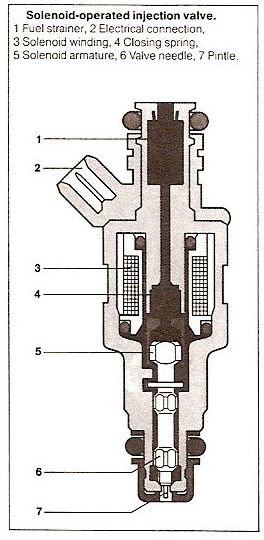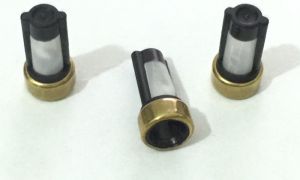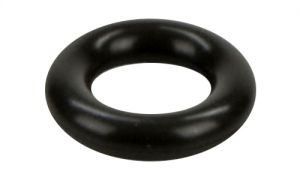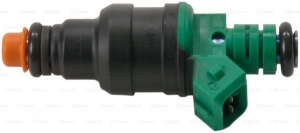Displaying items by tag: 964
Fuel injectors, nearly all cars have them, you probably have heard about them, but do you know what they do and how they do it?
If you now have a reason to be looking into fuel injectors, this is probably the article for you to read.
For this article, we will be concentrating on the common EV1 type injector, but all electrical fuel injectors pretty much work in the same way.
What is a fuel injector?
Pretty much as the name suggests, the fuel injector is an electrically controlled device to inject (or rather spray) a fine mist of fuel, usually there is one per cylinder in your engine, and usually they will open once every two revolutions of the engine.
The fuel is obviously needed to mix with the air being sucked into the engine, to then be ignited by the spark plugs. But for this to happen efficiently, the fuel needs to be sprayed in a fine mist, rather than just a squirt like you would get from a water pistol.
Usually fuel injectors are mounted in the intake manifold, usually quite close to where the intake manifold meets the cylinder head.
How do they work?
Fuel is pumped from the fuel tank at high pressure, usually around 2.5 to 4.0 bar of fuel pressure (or 36 to 58 Pounds per square inch, or PSI), through a fuel filter, and then on to the fuel rail or rails, which often mount to the tops of the fuel injectors and distribute high pressure fuel to all the fuel injectors at the same time.
Inside the fuel injectors, there is a coil and armature (or needle valve), which act like a tap to open and close the fuel injectors whenever electricity is passed through the injector. This happens through an electromagnetic effect of the electricity passing through the coil, causes a metal rod through the middle of the injectors, known as an ameture, to move up and down, opening the needle and its seat to allow fuel to flow.
The engine management system (also known as an ECU, EMS or in German cars, the DME), watches the engine via its sensors, and decides when to open and close the injectors, based on how much fuel it thinks the car needs at that precise moment, switching on and off the supply of power flow through the injectors, depending on the car and engine speed, it could be doing this 600 times a second (V8 four stroke engine at 9000 rpm with sequential injection).
At the tip of the injector, which is usually inside the intake manifold, there is usually an opening (or opening) which is designed to shape the fuel flowing out of the injector into a cone shape of finely atomised fuel.
What are the components of a fuel injector.
There are many components within the fuel injector, some of them serviceable as part of a restoration both internally and externally, but some parts are not replaceable.

Coil.
The coil within an injector is effectively copper wire wound around and around in a circle, with a hole through the middle, often this will be wound in a tube shape.
When electricity passes through the coil, it forms a temporary magnet, creating an electro magnetic field.
Usually the coil has an electrical resistance of between 2 and 10 ohms, this is what causes some injectors to be called high or low impedance, another word for electrical resistance. It is important to have fuel injectors of the correct resistance, as the wrong type will either require more electrical energy than your cars wiring or the engine management computer is happy to supply, or will in your car be to weak to accurately open and close completely or fast enough.
Armature.
through the middle of the coil, a rod of good magnetic properties, but be resistant to becoming a permanent magnet, that sits normally at rest, that is until electricity passes through the coil windings.
If you have ever played with magnets as a child, you will know that if you place two magnets together, they will either repel one another with great force, or will be attracted to one another with great force. You may also know that this causes the magnet to have a north and south pole.
When the coil has electricity passing through its windings, in the right direction, it will make a magnetic field with a north or south pole, and therefore will either push the armature upwards, or downwards.
The armature moving upwards, or downwards, depending on the design of fuel injector, will open or close the injector, by lifting or pushing a needle away from its seat which seals the injector.
Armature Spring.
Within the fuel injector, there is also usually a spring, which is designed to return the armature back to its rest position when the coil is no longer pushing the armature using electromagnetic force.
Needle.
Usually, fuel injectors have an internal needle, which moves with the armature, and lifts away from a seat, which allows fuel to flow through a hole in the tip of the injector, also known as the injector nozzle.
Nozzle and cap.

Also known as the pintle protection cap, this is designed to protect the end of the needle and often has a cone shape around the needle to promote the fuel to spray in a cone shape. Usually the cone shape within the protection cap will not actually touch the fuel, but has the effect of shaping the fuel spray pattern.
Internal Filter.

At the other end of the injector, where the fuel enters, is an internal fuel filter, this is the last stage of protection from particles in your fuel blocking the injector or even worse, being abrasive and wearing out the injector.
These filters should not be confused with the main fuel filter, which is usually between the fuel pump (near the fuel tank) and the fuel rail (which supplies the fuel injectors)
Seals.

Normally there is at least two seals on an injector. One sealing the injector into the intake manifold, so that air is not drawn into the manifold around the injector, and another seal at the top to seal the injector into the fuel rail.
Things that can go wrong with a fuel injector.
Blocked filter.
Over time, the fuel injectors internal fuel filter baskets become clogged with debris. This will limit the amount of fuel consumed, and can cause a misfire, which typically will become worse at higher rpm or larger throttle openings. Special tools are required to replace the filter baskets within fuel injectors, and it is important that they are changed with the correct parts with the correct materials. More about this later.
Internal dirt and debris.
As the miles pass by, the fuel injectors can become plugged up with contamination. This can be in the form of a sludge, gum, varnish or even a build up of minerals. Fuel is not perfectly pure, and is after all the processed remains of prehistoric animals and plant life, so it is no surprise that over time small particles get past the filters and slowly build up inside the injectors, limiting fuel flow, but also causing the needle to stick or be slower to move, causing more or less fuel flow than is correct.
Each of these different contaminates have different chemicals which can break them down. To do this the chemical needs to be a solvent (able to dissolve) those contaminates, and the chemical needs to be compatible with fuel (able to be soluble in fuel) but unfortunately, often the contaminants after not soluble in fuel, otherwise they would not have ended up stuck inside the fuel injector, so although fuel additives can help clean some types of contamination from injectors, they rarely will completely clean a fuel injector and sometimes will not work at all.
This is the same problem with the new wave of "on the car" fuel system cleaning machines. Often these machines temporarily replace the fuel pump and fuel tank from the circuit, and can feed the engine with a mix of fuel and harsh chemicals to intensively clean the injectors or carbon from inside the engine. However the problem with these systems, like the fuel additives, is that often the chemicals needed to clean the fuel injectors, are not compatible with fuel. With these machines your injectors and engine are just getting a more intensive cleaning process.
The only real way of cleaning contamination from inside the fuel injectors is to remove them from the car, strip them down completely, and ultrasonically clean the injectors, test them, and then rebuild them with all new consumable parts (filter baskets, seals, spacers, pintle caps etc) But to do this, you need a machine which is able to test the fuel injectors flow and latency (how quickly the injectors open and close), as well as the equipment to strip down the injectors and to fit the new parts properly. You also need one or more ultrasonic cleaners of an industrial grade, as well as some very dangerous chemicals which are extremely hazardous!
At JMG Porsche, we use a Bosch (manufacturer of Porsche injectors) and Lucas (Another injector manufacturer) approved machine for flow testing the fuel injectors. We also use special custom made rig to monitor the fuel injectors to precisely know when they have opened and closed during testing, which means we can analyse if the fuel injectors are taking too long to open and close, which can seriously impact injector performance and the amount of fuel delivered.
We also use a three stage process of cleaning the injectors, in three industrial ultrasonic cleaning machines, which use heated chemicals of different types to clean different types of contamination. This process is so intensive that it even removes paint and corrosion from the fuel injectors, but does not harm good metals or the plastics. (once the injectors are stripped down, cleaned, tested, rebuilt and tested again, we also use a special process to repaint the injectors, so they look like new and are protected from external corrosion.)
Pintle cap wear.
Over time, even though the fuel should not touch them, or barely touches them (apart from with multi orifice injectors), they do wear out over time, can age and crack, causing all kinds of problems with spray patterns. If not caught early enough, the cap can even fall off into the intake of the engine, and be injected by it, causing in some cases catastrophic damage.
Coil failure.
Sometimes the windings within the coils can break. Although this is rare, it can happen. Unfortunately there is very little than can be done with this kind of failure and usually the only way to rectify the problem is with injector replacement.
Needle problems.
In the workshop we have seen injectors fail due to the internal needle breaking or bending. Usually this will be caused either through metal fatigue, or through impact damage. With the second cause, if you have to remove your fuel injectors for any reason, you have to be very careful with how you handle them, they are very delicate. Dropping them, or putting them down nozzle first can damage the tip of the needle.
Sticking armatures or needles.
We are seeing more of this problem now. Usually caused be extreme levels of contamination inside the injectors, but also through corrosion.
In recent years fuel (in the UK and Europe for example) has had an increasing amount of Ethanol (Alcohol) blended with it. This is for environmental reasons and should lower the carbon footprint of your car. However, Ethanol is very good at absorbing water and water vapour, effectively this fuel can suck humidity out of the air! The problem is that the water is obviously corrosive to the internals of the fuel injector.
Ethanol can also attack many forms of plastics and which has meant that for rebuilding fuel injectors, it is important to make sure that the parts are Ethanol Friendly, which many parts sold for Porsche injectors are not Ethanol friendly.
Where to have your fuel injectors repaired?
We never decided we wanted to be in the business of rebuilding fuel injectors. However we had to get involved through necessity!
In years gone by, if a fuel injector failed, it was often possible to buy new ones (Only buy OEM ones, such as Bosch in the case of Porsche injectors) for not much more than the cost of rebuilding them. However Bosch have since 2014 been slowly discontinuing the manufacture of injectors for pre 1998 Porsche models, such as the 944, 924S, 928 and 911 Air cooled models, so over the last few years, we had been actively hunting for a company who could restore fuel injectors back to good working order. This was not as easy as we thought.
As a result, we had to move into the fuel injector restoration business, which was a long three year process of research, training and experimentation. The full story is listed here.
There may be a company near you who can test and restore your fuel injectors, but please use the following check list.
- The repairer has a proper fuel injector flow bench.
- The repairer is able to test the fuel injector latency on opening and closing.
- The repairer is able to test the fuel injector resistance or impedance
- The repairer is using genuine OEM parts to rebuild the injectors.
- The repairer is using proper equipment to strip down and rebuild the injectors.
- The repairer is using a multi stage cleaning process with several different chemicals.
- The repairer is using heated industrial ultrasonic cleaners.
- The repairer will be able to paint the body of the injectors to protect them from corrosion.
- All the parts used must be new fuel/ethanol friendly.
- Most importantly, that they have the specifications for your fuel injectors, for all of the above data to compare to your injectors!
So concludes our initial fuel injector basics article, we hope you have found it useful.

Your Porsche 964 or 993 Modified to your requirements.
The Porsche 964 and 993 are excellent vehicles as standard. However perfection can always be improved.
With over 40 years experience modifying Porsche air cooled engines and cars, JMG Porsche are able to improve your Porsche beyond recognition. Anything from a simple replacement engine management chip, through to a wild engine 3.8 (or larger) conversion, possibly including twin turbo chargers, JMG Porsche should be your first stop.
Masters of the Bosch Motronic engine management system used in your Porsche, JMG are able to live remap your engine management system to tailor it for your intended use, as well as your prefered fuel types and grades, removing its ability to run on very poor fuel grades you will never encounter in Europe, is one step to improved performance without degraded reliability. For those with a smaller budget, we can also provide off the shelf chip replacements or DME/ECU modification to improve your Porsche.
Performance
Porsche 964 Carrera Improvements (Including RS)
- Cylinder head modifications for torque, mid range and high rpm performance increases
- Performance stainless steel exhaust systems
- Chip tuning
- Conversion to 3.8 Engine capacity
- Conversion to Turbo engine types (3.3, 3.6 or even 3.8)
- Mass Airflow sensor conversion (MAF Sensor)
- Performance air filtration
- Cam shaft upgrades
- Induction system upgrades
- Engine rebuilds to any specification (fast road, track, race, stoker & big bore)
- Nitrous oxide (for the wild customer)
- Road and dyno tuning with datalogging
964 3.3 & 3.6 Turbo
- Cylinder head modifications for torque, mid range and high rpm performance increases
- Performance stainless steel exhaust systems
- Motronic chip modification (3.6 Motronic EFI Versions)
- CIS Injection modification (3.3 CIS Injection types)
- Wastegate upgrades
- Boost controllers
- Hybrid turbochargers
- Intercooler upgrades
- Conversion to 3.6 or 3.8 Engine capacities
- Performance air filtration
- Cam shaft upgrades
- Induction system upgrades
- Engine rebuilds to any specification (fast road, track, race, stoker & big bore)
- Nitrous oxide (For wild conversions, anti lag or drag use)
- Road and dyno tuning with datalogging
993 3.6 non Turbo (Including RS)
- Cylinder head modifications for torque, mid range and high rpm performance increases
- Performance stainless steel exhaust systems
- Cat bypass
- Chip tuning
- Conversion to Turbo engine types (3.6 or 3.8 Engine sizes)
- Performance air filtration
- Cam shaft upgrades
- Induction system upgrades
- Engine rebuilds to any specification (fast road, track, race, stoker & big bore)
- Nitrous oxide
- Road and dyno tuning with datalogging
993 Turbo
- Cylinder head modifications for torque, mid range and high rpm performance increases
- Performance stainless steel exhaust systems
- Wastegate upgrades
- Boost controller upgrades
- Intercooler upgrades
- Cat bypass (may not be street legal)
- Chip tuning
- Performance air filtration
- Cam shaft upgrades
- Induction system upgrades
- Engine rebuilds to any specification (fast road, track, race, stoker & big bore)
- Nitrous oxide (For wild use and Anti lag)
- Road and dyno tuning with datalogging
Brakes.
- Front disk and calliper upgrades
- Conversion to M030 Brakes
- Conversion to larger disks and callipers
- Cross drilled cross drilled
Handling.
- Conversion to Porsche sports suspension items (shock absorbers, springs and anti roll bars)
- Koni & KW suspension upgrades including conversion to coilover suspension
- Computerised 4 wheel alignment and geometry setup
- Customised ride height adjustment
- Customised anti roll bar upgrades
Transmission
- Conversion to other transmission types
- Conversion to limited slip differential
Wheels.
- Large stock of genuine wheel upgrades with a knowledge of which wheels will and will not fit
Weight reduction
- Shell stripdown and race prep
- Carbon fibre panels
- Lightweight components
Audio & In Car Entertainment.
- Speaker & head unit upgrades
- Custom car audio design and build
Styling.
- Modification to facilitate wider track and bodywork
- Modification to allow for better aerodynamics and ground effect
- Modernisation (alternative door mirrors, handles, spoilers, splitters and side skirts)

Your air cooled 911 3.2 Carrera, 964 or 993 is in the best of hands at JMG Porsche, where even with servicing we go beyond the factory schedule.
The factory schedule for many models calls for a service every year and in some cases every six months. But with many of these models being infrequently used as they become more valuable, some owners have chosen to service them less frequently. However we strongly recommend that all models are serviced at least annually, alternating between a minor and a major service each year. Click here and read our article for more information. Failing to do this, may not just cause damage to the cars systems, but also may damage its reseal value in a market where service history is king.
Porsche 3.2 Carrera, 964 and 993 Servicing.
Service interval - We strongly advise that all Porsche cars are serviced every year, with a major service every two years.
The service schedule can be confusing with some service items needing to be performed every X amount of years, with other items being specified every Y amount of miles.
At JMG Porsche we have built a database for each model car, where every two years of age for your car, has listed the major service it requires in that year, which combined with every year in between major services the car having an annual service.
This means that for your model of Porsche, we can provide you with a plain price list for servicing, no matter what year your car was made, which makes it easy to see what service items are due and what the total cost will be.
To get a copy of the current service guide and price list for your Porsche, just email us to have your copy emailed to you in PDF format.
Eventually we plan on making it possible to register to the website and be able to download the latest version of this price list - Watch this space!
Interesting service and repair information for the air cooled 911 models.
Engine failures - Not nearly as common as horror stories on the internet of top end rebuilds being required every 130,000 miles would have you believe, but there are still worthwhile ways of avoiding unexpected large engine rebuild costs. One of which is proper servicing by a real Porsche specialist, which may not need cost as much as you think. There are also some ways to avoid unexpected bills by following some of our other advice bellow.
Brake fluid - Did you realise this should be changed every two years? Not doing this can cause problems with expensive parts within your car, such as the ABS pump or any part of the brake hydraulics due to water contamination as the brake fluid actually sucks moisture out of the air (hydroscopic), so even if the car is not used, the brake fluid must be changed every two years!
Transmission services - Not clearly noted by Porsche for when the transmission should be serviced and this vital expensive part of your car should not be overlooked. Just like your engine, the transmission is filled with oil/transmission fluid, which over time degrades. Not only this, but not many realise that many Porsche transmissions also contain a filter, which becomes clogged over time and can starve your transmission of lubrication, causing expensive repairs. We recommend all Porsche transmissions are serviced every 4 years or 40,000 miles, whichever comes soonest.
Diagnosis - Long has gone where cars had limited electrical equipment and a wiring diagram could be found in a manual from Halfords. Now the Porsche models have multiple separate computer systems, which all talk via networks, and many sensors to feed those computers with information about the world around it all tied together with many hidden wiring looms of thousands of wires and connectors. This can mean that in the event of your Porsche suffering an electrical issue, it is important that a Porsche specialist auto electrician is available, as we have at JMG Porsche. It is also important to understand that sometimes, finding the fault will not be as simple as plugging in a computer.
Drive Belt - Many of you may have had cars where a drive belt, timing belt or cam belt needs to be changed at a regular interval. Your Porsche model has a belt or belts which should be changed every 4 years. Failure to do so can cause instant overheating, loss of alternator charging and damage to the engine very suddenly. We recommend you have this changed at least every 4 years.
Heavy clutch? - A heavy feeling clutch which is stiff to use is not normal on a Porsche and often a sign that the clutch has almost worn out. Ignoring this can cause further damage, such as to the flywheel and clutch fork.
Alarm system - At JMG Porsche we are experts of all Porsche security systems and have reverse engineered all the various control units. This not only means we can program new alarm control units and keys to your car (late models), just as the main dealer can, but in some cases we can repair your old alarm control unit and keys, or in some cases recover your old keys to be used on the new alarm control unit, which is a service unique to JMG. For all air cooled 911 models we can bypass the original alarm system and install more modern alarm systems in their place which are Thatchum (insurance standard) approved.
Alarm system causes - In most cases the cause of alarm control unit failure is water damage, we can perform modifications to your Porsche model to help mitigate the chances of this happening to your Porsche.




